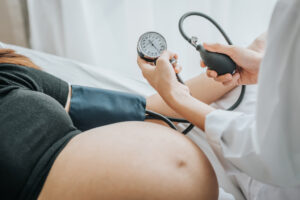Pregnancy and after the birth of your baby are unique opportunities to embrace healthy lifestyle choices including a healthy diet and regular exercise. This is especially important if your BMI is >25. Not all hospitals routinely weigh women throughout pregnancy but it is important to keep an eye on your weight gain.
You are not eating for two and the average woman only needs an extra slice of toast a day to meet the calorie requirement of pregnancy. Remember, if you gain it you will have to lose it afterwards!
Gestational weight gain (GWG) guidelines were published by the Institute of medicine in 2009. These recommendations are based on BMI in the first trimester of pregnancy. BMI is your weight in kilograms divided by your height in metres squared. Recommended GWG is 12.5-18kg for women with a normal BMI, 6-11kg for women with a BMI between 25 and 30, and 5-9kg for women with a BMI >30.
So how do you maintain a healthy weight during pregnancy and prevent postpartum weight retention? A randomised control trial examining the effect of a low glycamic index (GI) diet on pregnancy outcomes including gestational weight gain showed that women in the intervention arm gained significantly less weight in pregnancy (12.2 vs. 13.7kg; p=0.01). Furthermore, they continued this positive lifestyle intervention to 3 months postpartum. This resulted in greater weight loss from pre-pregnancy to 3 months postpartum than the control group (1.3 vs. 0.1 kg, p = 0.022).
Encouraging a positive lifestyle change during pregnancy and postpartum requires a multidisciplinary approach including general pracitioners, obstetricians and dieticians. But what is the best forum to deliver this support? A recent study has used positive lifestyle interventions in conjunction with web based technology in an effort to improve pregnancy outcomes for mother and baby by reducing the incidence of gestational diabetes mellitus. The PEARS study, a randomised controlled trial in women with a BMI ≥25kg/m2 used a healthy lifestyle package including a motivational counselling session to encourage behaviour change, low glycaemic index, nutritional advice and daily physical activity prescription delivered before 18 weeks gestation, as well as a smart phone app to provide ongoing healthy lifestyle advice and support throughout pregnancy.
In terms of exercise if you are already active continue this during pregnancy. Pregnancy and postnatal yoga and pilates are great options. Other non-weight bearing exercises such as swimming or cycling can work too. If in doubt ask a trainer in your gym to modify your exercie regime for pregnancy. Remember if it is uncomfortable stop. Seek advice from your doctor if you are not sure or are having a complicated pregnancy. Most women can resume prepregnancy exercise regimes after 6 weeks postpartum. When you have a new baby you will be tired but try to get active. Go for a walk, join and mother and baby exercise group.






